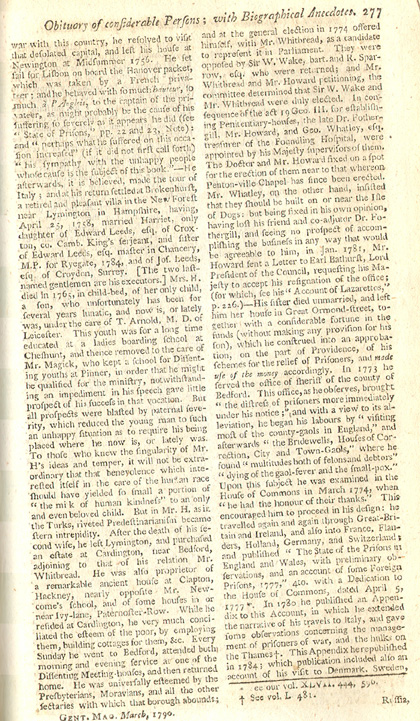Gentleman's Magazine Images
John Howard Obituary, Feb. 1790
Local and family history A-Z > Gentleman's Magazine > Gentleman's Magazine Images
Transcription of the Report Obituary (Page 277)
with this country, he resolved to visit that desolate capital, and left his house at Newington at Midsummer 1756. He set sail for Lisborn on board the Hanover packet, which was taken by a French privateer; and he behaved with so much hauteur, to much a l Anglois, to the captain of the privateer, as might probably be the cause of his suffering so severely as it appears he did. (see State of Prisons, pp.22 and 23,Note); and perhaps what he suffered on this occasion increased( if it did not call forth) his sympathy with the unhappy people whose cause is the subject of this book. He afterwards, it is believed, made the tour of Italy; and at his return settled at Brokenhurst, a retired and pleasant villa in the New Forest near Lymington in Hampshire, having, April 25,1758, married Harriet, only daughter of Edward Leeds, esq of Croxton, co. Camb. Kings sergeant, and sister of Edward Leeds esq. Master in Chancery, M.P. for Ryegate, 1784, and of Jos Leeds, esq of Croydon, Surrey.(The two last named gentlemen are his executers). Mrs. H. died in 1765, in child-bed, of her only child, a son, who unfortunately has been for several years lunatic, and now is, or lately was, under the care of T. Arnold, M..D. of Leicester. This youth was for a long time educated at a ladies boarding school at Cheshunt, and thence removed to the care of Mr. Magick, who kept a school for Dissenting youths at Pinner, in order that he might be qualified for the ministry, notwithstanding an impediment in his speech gave little prospect of his success in that vocation. But all prospects were blasted by paternal severity, which reduced the young man to such an unhappy situation his being placed where he now is, or lately was. To those who knew the singularity of Mr. Hs ideas and temper, it will not be extraordinary that that benevolence which interpreted itself in the care of the human race should have yielded so small a portion of the milk of human kindness to an only and even beloved son. But in Mr. H. as in the Turks, riveted Predestinarianism became stern intrepidity. After the death of his second wife, he left Lymington, and purchased an estate at Cardington, near Bedford, adjoining to that of his relation Mr. Whitbread. He was also proprietor of a remarkable ancient house at Clapton, Hackney, nearly opposite Mr. Newcomes school, and of some houses in or near Ivy Lane, Paternoster Row. While he resided at Cardington, he very much conciliated the esteem of the poor, by employing them, building cottages for them etc. Every Sunday he went to Bedford, attended both morning and evening services at one of the Dissenting Meeting houses, and then returned home. He was universally esteemed by the Presbyterians, Moravians, and all the other sectaries with which the borough abounds; and at the general election in 1774 offered himself, with Mr.Whitbread , as a candidate to represent Parliament. They were opposed by Sir W.Wake, bart. And R. Sparrow esq. Who were returned; and Mr. Whitbread and Mr. Howard petitioning, the committee determined that Sir W.Wake and Mr. Whitbread were duly elected. In consequence of the act 19 Geo. 111 for establishing Penitentiary houses, the late Dr. Fothergill, Mr. Howard and Geo. Whatley, esq. Treasurer of the Foundling Hospital, were appointed by his Majesty supervisors of them. The Doctor and Mr. Howard fixed on a spot for the erection of them near to that whereon Penton-ville Chapel has since been erected. Mr. Whatley, on the other hand, insisted that they should be built on or near the Isle of Dogs.; but being fixed in his own opinion, having lost his friend and co-adjutor Dr. Fothergill, and seeing no prospect of his accomplishing the business in any way that would be agreeable to him, in Jan. 1781, Mr. Howard sent a Letter to Earl Bathurst, Lord President of the Council, requesting his Majesty to accept his resignation of the office;(for which, fee hisAccount of Lazarettos,p.226) His sister died unmarried, and left him her house in Great Ormond Street, together with a considerable fortune in the funds(without making any provision for his son), which he construed into an approbation, on the part of Providence, of his scheme for the relief of Prisoners, and made use of the money accordingly. In 1773 he served the office of sheriff of the county of Bedford. This office, as he observes, brought the distress of prisoners more immediately under his notice and with a view to its alleviation, he began his labours by visiting most of the county-gaols in England, and afterwards the Bridewells, Houses of Correction, City and Town- Gaols, where he found multitudes both of felons and debtors dying of the gaol-fever and the small-pox. Upon this subject he was examined in the House of Commons in March 1774, when he had the honour of their thanks. This encouraged him to proceed in his design: he travelled again and again through Great Britain and Ireland, and also to France, Flanders, Holland, Germany and Switzerland; and published The State of the Prisons in England and Wales, with preliminary observations, and an account of some Foreign Prisons, 1777, with a dedication to the House of Commons, dated April 5, 1777. In 1780 he published an Appendix to this Account, in which he extended the narrative of his travels to Italy, and gave some observations concerning the management of prisoners of war, and the hulks on the Thames. This Appendix he published in 1784; which publication included also an account of his visit to Denmark, Sweden,
| Previous |
Page last updated: 20th October 2013

